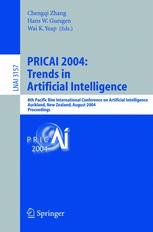

Most ebook files are in PDF format, so you can easily read them using various software such as Foxit Reader or directly on the Google Chrome browser.
Some ebook files are released by publishers in other formats such as .awz, .mobi, .epub, .fb2, etc. You may need to install specific software to read these formats on mobile/PC, such as Calibre.
Please read the tutorial at this link: https://ebookbell.com/faq
We offer FREE conversion to the popular formats you request; however, this may take some time. Therefore, right after payment, please email us, and we will try to provide the service as quickly as possible.
For some exceptional file formats or broken links (if any), please refrain from opening any disputes. Instead, email us first, and we will try to assist within a maximum of 6 hours.
EbookBell Team

0.0
0 reviewsThe Pacific Rim International Conference on Artificial Intelligence (PRICAI) is a biennial international event which focuses on Artificial Intelligence (AI) theories and technologies, and their applications which are of social and economic importance for countries in the Pacific Rim region. Seven earlier conferences were held in: Nagoya, Japan (1990); Seoul, Korea (1992); Beijing, China (1994); Cairns, Australia (1996); Singapore (1998); Melbourne, Australia (2000); and Tokyo, Japan (2002). PRICAI 2004 was the eigth in the series and was held in Auckland, New Zealand in August 2004. PRICAI 2004 had attracted a historical record number of submissions, a total of 356 papers. After careful reviews by at least two international Program Committee members or referees, 94 papers were accepted as full papers (27%) and 54 papers (15%) were accepted as posters. Authors of accepted papers came from 27 countries. This volume of the proceedings contains all the 94 full papers but only a 2-page - tended abstract of each of the accepted posters. The full papers were categorized into four sections, namely: AI foundations, computational intelligence, AI technologies and systems, and AI specific application areas. Among the papers submitted, we found “Agent Technology” to be the area having the most papers submitted. This was followed by “Evolutionary Computing”, “Computational Learning”, and “Image Processing”.